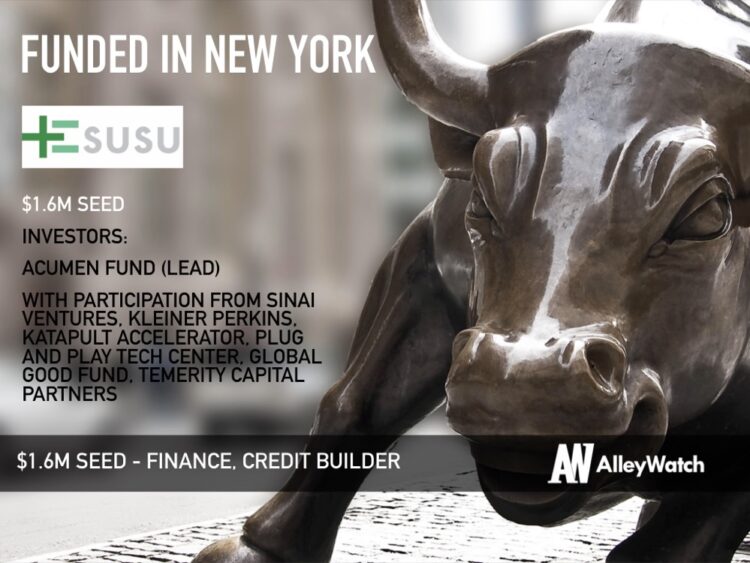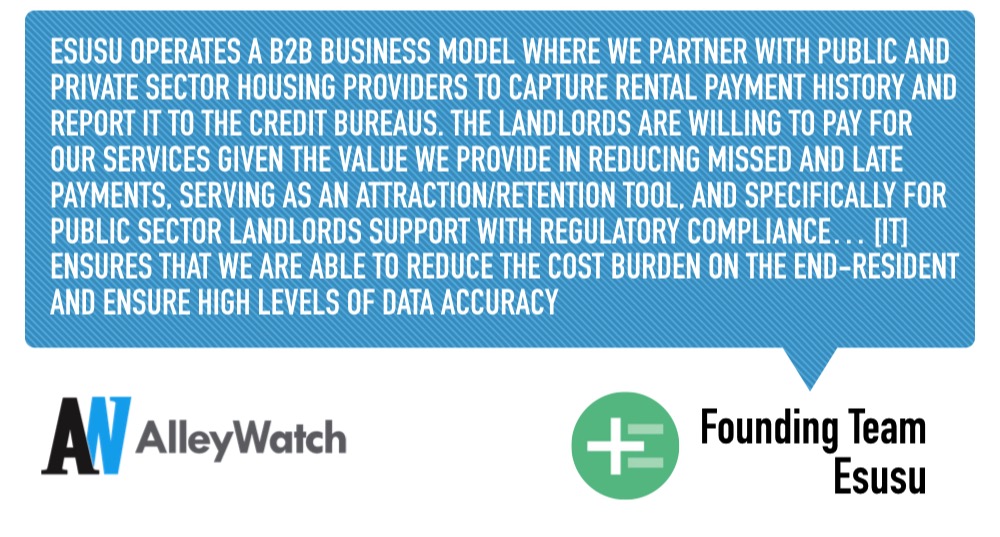Rent reporting is a great alternative way for lower and middle-income families to build credit. Traditionally there has been no easy, streamlined way to report rent, so less than 1% of rental payment data is reported to the credit bureaus. This is beginning to change due to platforms like Esusu, the credit building app that gives renters credit for making monthly payments. This app has the potential to help approximately 45 million Americans, who are currently marginalized from formally entering the financial system. On the flip side, Esusu’s app is highly beneficial for landlords because it encourages tenants to pay on time, reduce vacancies, and decrease apartment turn-over rates.
AlleyWatch learned about the impact of Esusu from cofounders Abbey Wemimo and Samir Goel. Esusu has now raised a total of $2M across two rounds.
Who were your investors and how much did you raise?
Esusu Raised $1.6M in seed funding led by Acumen Fund with participation from Sinai Ventures, Kleiner Perkins, Katapult Accelerator, Plug and Play Tech Center, Global Good Fund, Temerity Capital Partners, and angel investors.
Tell us about the product or service that Esusu offers.
Esusu is a credit building app and technology platform designed to help people save money and build credit. Esusu’s flagship rent reporting platform gives renters credit for making monthly payments. Esusu partners with landlords to capture rental payment history while providing tenants with a mobile application to review their rental history and view their credit score for free. This allows tenants to build and establish their credit scores while helping property owners attract tenants, reduce turnover, and improve collections to increase their operating income.
 What inspired you to start Esusu?
What inspired you to start Esusu?
We started Esusu to pave a permanent bridge to financial access by providing financial solutions for low-to-middle income consumers. We are inspired by our shared experiences growing up in working-class, immigrant households that were marginalized from access to credit and support from traditional financial services resources. Our parents used versions of Esusu to save and pay for living expenses like school fees. We decided to digitize this peer to peer savings system that has been around for centuries. We quickly learned that before our customers can save effectively they need access to credit. That sparked the innovation behind adding our rent reporting app as a credit building solution. We understand what it feels like to be excluded from the financial system – without a credit profile or a financial identity.
How is Esusu different?
Esusu aims to solve the gaps in our current financial system that prevent immigrant, minority and low-to-middle income communities from building credit and prospering. Rent reporting is gaining popularity but even today less than 1% of rental payment data is reported to the credit bureaus. However, rent reporting is just step-one of our broader mission to help unlock financial opportunity through credit for millions. We firmly believe that credit (more specifically your credit score) is the first stop on the path to financial health. There are over 45 million residents in America alone that are unscored or underscored – we are committed to changing that and creating wealth for disenfranchised communities.
Many Americans don’t know their credit score and are blind to the reality that millions are unscored which is a major barrier to financial access. Esusu is your trusted go-to resource to make it easier than ever to report your rent payments to credit bureaus. You can boost or establish your credit score quickly and you can always view your credit score in real-time. We aim to address the very real pain points people experience every day.
What market does Esusu target and how big is it?
Esusu is committed to helping the 45 million Americans who don’t have a credit score. Our platform helps to score them and will ultimately unlock over $3 trillion in untapped capital. Our target market is massive given the harsh reality that 150 million Americans are experiencing financial difficulty, of that number some 70 million people have less than $400 in the bank.
What’s your business model?
Esusu operates a B2B business model where we partner with public and private sector housing providers to capture rental payment history and report it to the credit bureaus. The landlords are willing to pay for our services given the value we provide in reducing missed and late payments, serving as an attraction/retention tool, and specifically for public sector landlords support with regulatory compliance.
This is not only the most efficient way for us to scale but also ensures that we are able to reduce the cost burden on the end-resident and ensure high levels of data accuracy which is critical as we help drive a movement for the acceptance of alternative data for credit scoring.
How has the business changed since we spoke last year?
We are growing and innovating. Esusu launching our rent reporting platform has been one of the biggest changes this year. We are excited to continue to bring on new partners and scale this capability nationwide.
What was the funding process like?
It was hard. Nothing can quite prepare you for being a founder or for the all-consuming fundraising experience. We took a very strategic approach. We started the company as a side hustle. This allowed us to work and have income and save money upfront. As a team, we decided when to leave our full-time jobs to fully commit to Esusu. It requires a lot of sacrifice because you have to put your company first. This mission is personal for us. At the start, we did a friends and family round to get the company in-market and we raised more money than expected from those close to us. You need grit throughout this process. We reached out to a lot of VC firms and we had to prepare mentally for hearing no. It’s essential to have a great team that creates a strong support system.
What are the biggest challenges that you faced while raising capital?
Raising capital is an extremely draining process for any founder. It eats at your ability to focus on the business, mental health, and all your personal relationships. The difficulty of fundraising and these effects are only amplified for minority founders building a business that serves low-to-middle income individuals. Silicon Valley struggles to embrace founders like us building businesses like ours and that only makes this process of raising capital more challenging.
What got us through this process was the strength of our partnership as cofounders, the community around us, and finding the right investors who were willing to take a bet on a business that could not only be highly profitable but truly make an impact on the world. The silver lining is that fundraising is often (and rightly so) called purposeful pain. Without this process, as challenging as it was, we would not be as far along as we are now in defining our vision and building a plan of execution.
The difficulty of fundraising and these effects are only amplified for minority founders building a business that serves low-to-middle income individuals. Silicon Valley struggles to embrace founders like us building businesses like ours and that only makes this process of raising capital more challenging…fundraising is often (and rightly so) called purposeful pain. Without this process, as challenging as it was, we would not be as far along as we are now in defining our vision and building a plan of execution.
What factors about your business led your investors to write the check?
From our vantage point, there were three things that led our investors to write a check. First, they understood the magnitude of our vision and how it’s rooted in providing sustainable financial access for all. They also grasped how big the opportunity is and the market size of 45 million Americans currently marginalized. Last but not least, they connected with our team. Investors invest in people and we have an incredible team that has also experienced the plight of being marginalized.
What are the milestones you plan to achieve in the next six months?
We want to continue growing our revenue targets and onboarding more national partnerships to scale. We are focused on bringing our services to those who need them so we are prioritizing reach and further improving the customer experience. As rent-reporting gains momentum in policy conversations, we will continue to be a voice in these discussions advocating for credit building as a source of stability.
What advice can you offer companies in New York that do not have a fresh injection of capital in the bank?
If you are bootstrapping your company and in need of more capital, we highly recommend doing a friends and family round. Taking this step really helped us launch Esusu and build a community of supporters. It’s important to ask for introductions to investors, ideally from those that have successfully secured funding from them. Make the introduction process seamless by providing draft emails that they can make their own and forward. It’s important to always consider those who are helping you and express gratitude.
Where do you see the company going now over the near term?
When a startup first launches every decision is made from the perspective of scarcity. We started by finding ways to get the job done and innovate with the bare minimum and without undue risk. Once you are able to raise capital, it is paramount for your mindset to shift to a longer-term horizon where you make strategic investments for long term growth and scale. Over the coming months, we will be laser-focused on (1) team and culture building, (2) technology refinement with an emphasis on seamless user experiences, and (3) forging strategic partnerships that will help us reach as many people as possible. Given the rising debt and personal finance crisis in this country, we are confident this is the right time for a solution like Esusu that puts the end-user first.
Where is your favorite fall destination in the city?
Samir – Citi Field, for Mets post-season games 😉 or the northern half of Central Park.
Abbey – The rooftop at The Met / Metropolitan Museum of Art





